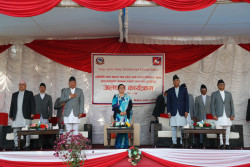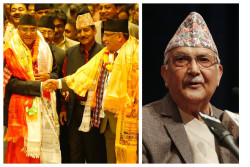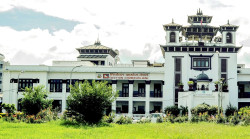Elections 2022
Preparations for the House of Representatives (HoR) and Province Assembly elections have been almost completed. Voting for the twin elections takes in a single phase on November 20.
Addressing a press meet on Thursday afternoon, Chief Election Commissioner Dinesh Kumar Thapaliya said, “All preparations for the elections have been completed. The elections will be conducted peacefully in a free, fair and peaceful manner.
"We call upon all citizens to vote freely without fear or influence.”
Fielding questions from journalists at the last presser before the elections, Thapaliya also reminded everyone about the things that are allowed and prohibited during the silent period.
What are the things we should be careful about during the elections?
1. Do's and Don't
The voting for the elections to the House of Representatives (HoR) and Province Assembly takes place from 7 am to 5 pm on November 20.
The silence period of the November 20 election commenced at midnight on Thursday. The Election Commission (EC) said the silence period comes into effect 48 hours before the voting day until the polls are closed.
According to the Election Code of Conduct 2022, political party office-bearers, candidates, or concerned individuals should abide during this period.
Canvassing by any method, process, or means and posting or sharing any message, information, or publicity material in support of or against any political party or candidate on social sites, online, print, or any medium is strictly prohibited.
Election campaigning and any discussion, interaction, assemblies, workshop seminars, gatherings, and holding public feasts, consuming and selling alcohol are also restricted. However, the candidates can hold a feast or any ceremony within the house solely with their family.
Likewise, the political parties or independent candidates are not allowed to distribute their election publicity materials within 300 metres of the polling station.
"During the silence period, all sorts of advertisements will asked to be taken down. The Advertisement Board will monitor it," said Thapaliya.
During this time, no one is allowed to disturb the voters or staff from three hours before the commencement of polling till the completion of polling.
Voters are prohibited from taking items like mobile phones or cameras inside the polling station.
2. Logistics
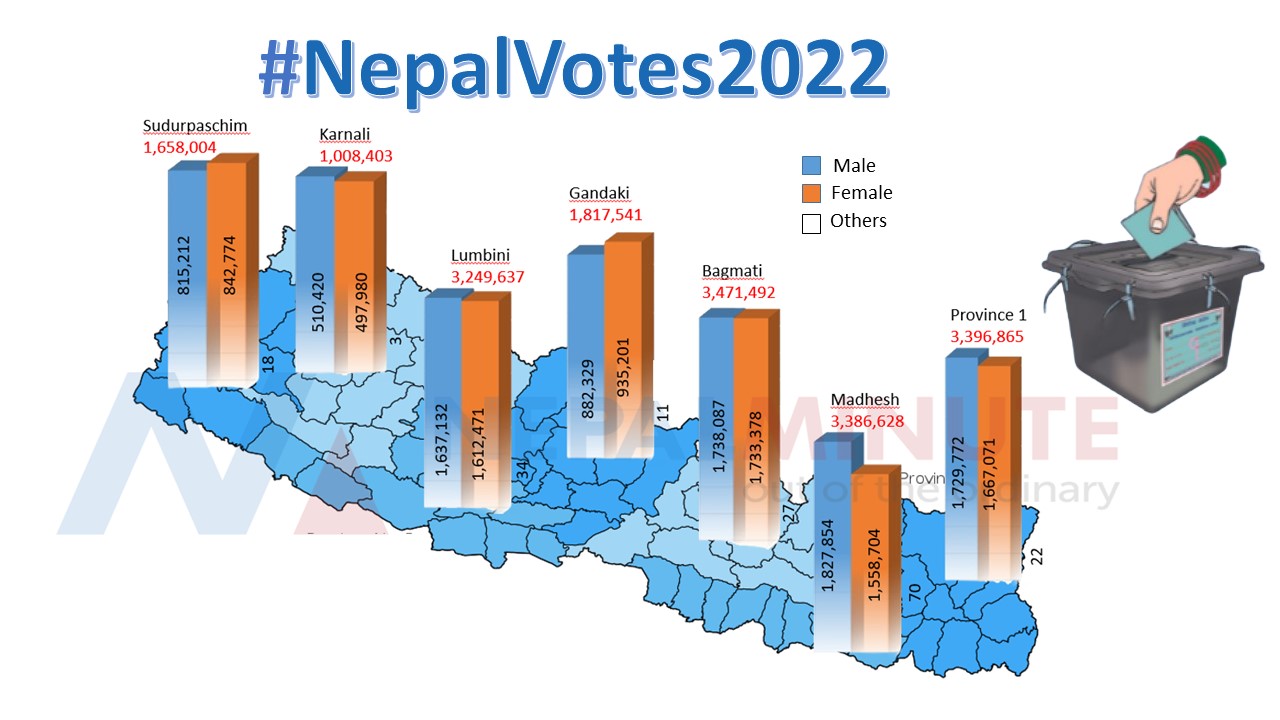
There are 753 local units in Nepal – six metropolises, 11 sub-metropolises, 276 municipalities, and 460 rural municipalities.
According to the Election Commission, there are 1,79,88,570 eligible voters and 22,227 polling stations have been set up in 10,892 places for these elections.
The commission has printed 8,4,21,500 ballot papers and shipped them to the respective places.
Thapaliya also said the ballot papers, among other election materials, had reached polling stations across the country.
The civil service employees – there are 2,46,960 of them – deputed for the elections, together with the EC staff and the security personnel, will complete set up polling stations in two days, the EC chief explained.
"We’ve instructed them to ensure the polling stations are gender inclusive, convenient for people with disabilities, pregnant women, senior citizens, sick,” he said.
According to the commission, 5,636 candidates will contest the elections to the House of Representatives and the Provincial Assembly under the first-past-the-post system, with 5,907 seats set aside for proportional representation in the final closed list.
3. Security
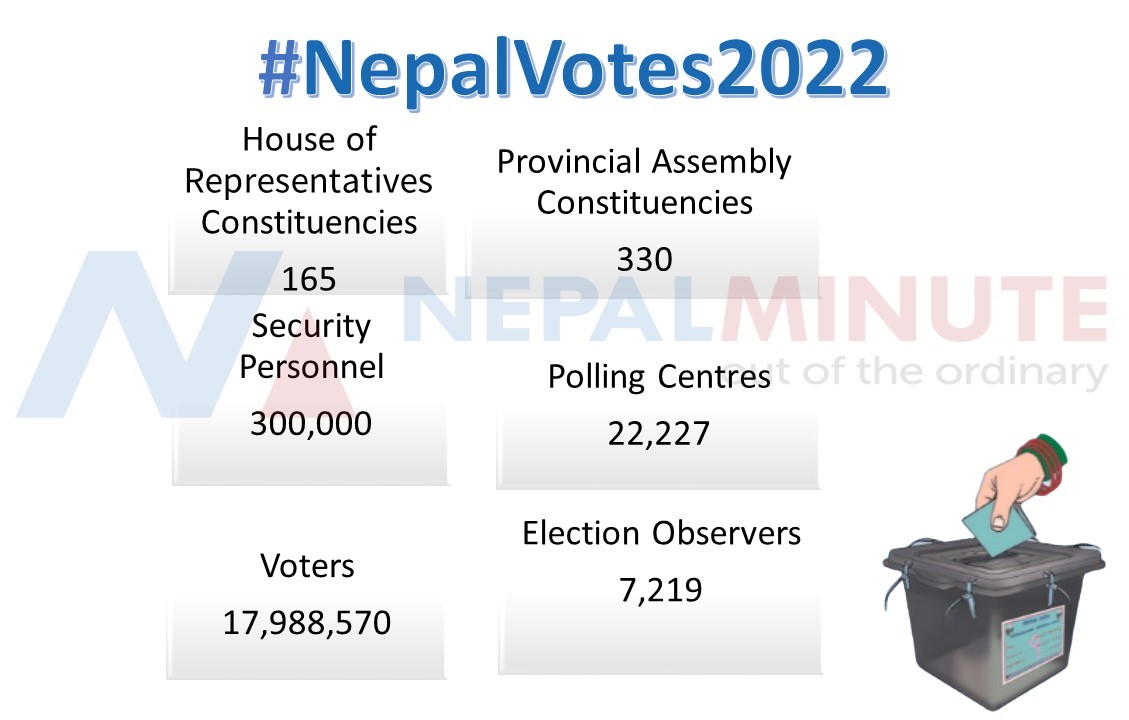
Beginning Thursday, the Nepal-India border have been sealed for 72 hours before the elections on the recommendation of the commission.
More than 300,000 personnel from the Nepal Army, Armed Police Force and Nepal Police, and Myadi (temporary) police have been mobilised for the elections. Security arrangements have been made in three tiers at each polling booth.
Security personnel have been mobilised with specific strategies to prevent activities with the intent to disrupt, boycott elections, occupy booths, and deprive voters of the opportunity to vote through fear and intimidation.
“A reserve force of security personnel will be on standby. They can respond within 30 minutes in case of any disturbance in polling stations,” said Thapaliya
Security forces would patrol around the polling centres in areas considered sensitive, he said, adding that empowered mobile police teams would keep a watch on chaotic elements.
4. Election observation
According to the EC, 7,219 people representing national and international organisations have taken permission to observe the elections.
The chief election commissioners of India, Bangladesh, Bhutan, and Maldives and election commissioners of Sri Lanka and South Korea will also monitor the elections.
Also observing the elections are a five-member team of Japan's Foreign Minister Takei Shunsuke and 18 diplomatic missions in Nepal.
5. Legal Action
The EC has warned that action will be taken against violating the silence period enforced since Thursday.
The returning and monitoring officers will promptly respond to any cases of violation during this period as per the Election (Offense and Punishment) Act, 2017.
Clause 24 (5) of the Act bans any election publicity campaigns before 48 hours of the voting day.
The EC or returning and monitoring officers can fine up to Rs 25,000 against anyone found acting in breach of the provision.
